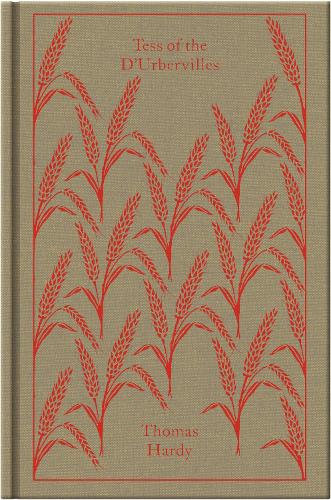
Tess of the D'Urbervilles
(Hardback)
Available Formats
Paperback
Published: 22nd April 1998
Paperback
Published: 3rd November 2008
Hardback
Published: 2nd December 1991
Paperback
Published: 15th March 2015
Paperback, Main
Published: 24th April 2018
Paperback
Published: 1st September 2013
Hardback
Published: 3rd September 2009
Hardback
Published: 8th May 2018
Paperback
Published: 5th September 2006
Paperback
Published: 21st November 2012
Hardback, New edition
Published: 15th February 2020
Paperback
Published: 5th May 1992
Paperback
Published: 26th May 2005
Paperback
Published: 15th March 2001
Publishing Details
Tess of the D'Urbervilles
By (Author) Thomas Hardy
Edited by Tim Dolin
Introduction by Margaret Higonnet
Penguin Books Ltd
Penguin Classics
3rd September 2009
6th November 2008
United Kingdom
Classifications
General
Fiction
823.8
Physical Properties
Hardback
592
Width 136mm, Height 206mm, Spine 48mm
728g
Description
Beautifully designed, clothbound edition Part of Penguin's beautiful hardback Clothbound Classics series, designed by the award-winning Coralie Bickford-Smith, these delectable and collectible editions are bound in high-quality colourful, tactile cloth with foil stamped into the design. When Tess Durbeyfield is driven by family poverty to claim kinship with the wealthy D'Urbervilles and seek a portion of their family fortune, meeting her 'cousin' Alec proves to be her downfall. A very different man, Angel Clare, seems to offer her love and salvation, but Tess must choose whether to reveal her past or remain silent in the hope of a peaceful future. With its sensitive depiction of the wronged Tess and powerful criticism of social convention, Tess of the D'Urbervilles is one of the most moving and poetic of Hardy's novels.
Reviews
[Tess of the DUrbervilles is] Hardys finest, most complex and most notorious novel . . . The novel is not a mere plea for compassion for the eternal victim, though that is the banner it flies. It also involves a profound questioning of contemporary morality. from the Introduction by Patricia Ingham
Author Bio
Thomas Hardy was born in a cottage in Higher Bockhampton, near Dorchester, on 2 June 1840. He was educated locally and at sixteen was articled to a Dorchester architect, John Hicks. In 1862 he moved to London and found employment with another architect, Arthur Blomfield. He now began to write poetry and published an essay. By 1867 he had returned to Dorset to work as Hicks's assistant and began his first (unpublished) novel, The Poor Man and the Lady. On an architectural visit to St Juliot in Cornwall in 1870 he met his first wife, Emma Gifford. Before their marriage in 1874 he had published four novels and was earning his living as a writer. More novels followed and in 1878 the Hardys moved from Dorset to the London literary scene. But in 1885, after building his house at Max Gate near Dorchester, Hardy again returned to Dorset. He then produced most of his major novels- The Mayor of Casterbridge (1886), The Woodlanders (1887), Tess of the D'Urbervilles (1891), The Pursuit of the Well-Beloved (1892) and Jude the Obscure (1895). Amidst the controversy caused by Jude the Obscure, he turned to the poetry he had been writing all his life. In the next thirty years he published over nine hundred poems and his epic drama in verse, The Dynasts. After a long and bitter estrangement, Emma Hardy died at Max Gate in 1912. Paradoxically, the event triggered some of Hardy's finest love poetry. In 1914, however, he married Florence Dugdale, a close friend for several years. In 1910 he had been awarded the Order of Merit and was recognized, even revered, as the major literary figure of the time. He died on 11 January 1928. His ashes were buried in Westminster Abbey and his heart at Stinsford in Dorset.
